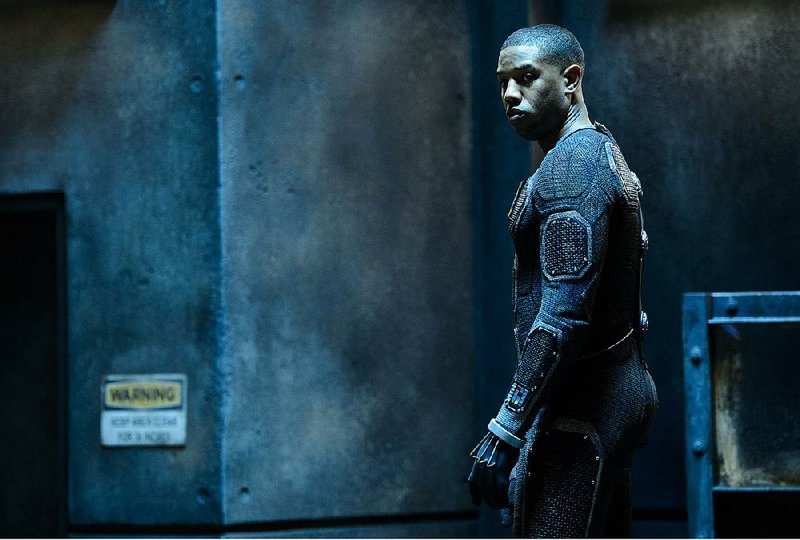Josh Trank's Fantastic Four was precisely the kind of release big studios dread the most: Expensive ($120 million, reportedly, and that's before marketing costs), dreadful, and worst of all, subject to a never-ending cascade of bad press, and leaked rumors of friction among director, actors and the suits upstairs.
No one comes out of a debacle like this unscathed -- not the studios, which stand to lose a substantial amount of money having tried to retool an already foundering franchise; not the director, 31-year-old Trank, formerly the toast of Hollywood after his low-budget Chronicle greatly exceeded its modest expectations, now rumored to be difficult, belligerent and willfully self-destructive (tweeting "A year ago I had a fantastic version of this. And it would've received great reviews. You'll probably never see it. That's reality though." on the day the film opened certainly didn't help); nor the cast and crew; nor the franchise itself. It's possible the film was so bad, 20th Century Fox will have virtually no choice but to cede the property back to Marvel Studios.
Of course, the film was no joy to watch, either, as critics across the nation concluded forcefully, but it
also put all of us in the cinematic evaluation business in a specific kind of quandary: How do you objectively review a film whose production was denigrated so publicly before the film ever saw the light of day?
There are two such situations that are particularly dangerous to a film critic: Coming to a film dreading what you're about to see, or breathlessly sitting in your seat in anticipation of something extraordinary. In both cases, your viewpoint is already tainted. In science, the act of interpreting data so that it neatly corresponds to a pre-existing theory you cultivate is known as motivated reasoning. In film criticism, it can quickly lead to the demise of your objectivity.
Of course, every so often, it happens that the exact opposite is the case. Wesley Morris, the excellent, Pulitzer-winning critic of Grantland.com, and formerly of the Boston Globe, once wrote about an experience he had at Cannes a few years back. Between screenings of things he had planned to see, he went on a whim to see Norte, The End of History, a Filipino film whose director, Lav Diaz, he knew precious little about. Planning to watch only an hour or so of Diaz's staggering four-hour-plus epic, he instead got thoroughly hooked and watched the entire film rhapsodically, feeling he had just stumbled upon completely unexpected genius. Many of the 200 critics in attendance for the midnight world premiere of Jennifer Kent's terrifying The Babadook at Sundance last year poured out of the theater convinced they'd seen one of the great horror films of the decade, almost precisely because so little was expected of it in the first place.
Ignorance is bliss
Nothing, it must be said, is sweeter than coming into a film absolutely ignorant and being thoroughly blown away by its viewing, an experience I'm happy to report I've had numerous times (with Joseph Cedar's Footnote and Haifaa Al-Mansour's Wadjda immediately coming to mind). As critics, as jaded as we are with the endless repetition of Hollywood genre stuff, finding something new, different and unforeseen makes us feel as if we've made a breakthrough discovery.
But what to do when you've been unable to ignore or avoid heavily rumored disasters before screening them? If you are convinced something will be awful before you see it, you've already written your review before the houselights begin to dim. Naturally, too, you can get too convinced of a film's impending brilliance to notice that it actually wasn't all that good.
Back when I was in high school, my friends and I were hotly anticipating Return of the Jedi, the concluding film of the Star Wars saga (or so we thought). I was the perfect age for the original Star Wars (which, for those keeping count, would be 11), and therefore grew up just enough in the intervening years before The Empire Strikes Back to find myself in perfect synchronization with the sequel. To my mind, Empire had already done all the heavy lifting of the second act; all Jedi had to do was follow the path laid out before it, and it would almost certainly have to be devastatingly brilliant.
We went opening night, my friends and I, and approximately two hours later, I left more bitterly disappointed than I had ever been with a movie in my young life. Driving home that night, I argued caustically with my friends about how incredibly lazy and awful the movie had been. My one friend, with whom I had watched Star Wars on the big screen approximately a baker's dozen times over the summer of '77, saw it much differently, which I simply couldn't understand. He thought it was pretty good, for the most part (and to be fair, I probably underplayed the effect of Leia's metal bikini at the time). Meanwhile, I vowed never to watch another George Lucas-helmed Star Wars film again. Later, when the fever pitch surrounding The Phantom Menace had reached critical mass, I witnessed the same phenomenon: Fanboys and critics who had staked their very existence on the release of the film initially responded wildly positively. It's only years later that the film began to be more universally decried as racist, boring and an insult to the original.
This kind of expectation bias cuts multiple ways, but always engenders a kind of dishonesty within yourself: Your opinion is so colored by your expectation, good or bad, what you conclude is tainted by your contamination. Once, Gene Siskel, the late Chicago Tribune critic who sat across the aisle from Roger Ebert on At the Movies, described the toughest part of the profession: having to be honest in your reactions to what you see, even if you're totally out of step with everyone else around you. This is, naturally, impossible, if you're already predisposed toward or against a given film.
Sometimes, of course, the cynical critic (as if there were any other kind) can take a perverse pleasure in expecting the opposite of the zeitgeist -- if this batch of critics love X, then it's probably going to totally stink! -- gleefully sending up others' exhortations to the movie-going public by laying the wood on the offensive piece, and blowing up their good will in the process. For some critics, that's the aspect of the gig they most enjoy. We can go ahead and call this the Armond White corollary.
The rumor mill
Keep in mind, of course, cinematic history is festooned with films that suffered dogged, miserable shoots and dredged-up rumors about in-over-their-head directors and clueless producers, only to prove everyone wildly wrong. Let's grab but two quick examples: First, we have a young, promising director promoted to his first big-time production involving an insanely difficult, on-location technical shoot, myriad problems with the script, and a major, practical special effect that constantly malfunctioned, pushing the shooting schedule far beyond its allotted time, causing the budget to swell and Universal, the studio bankrolling this disaster in the making, to wonder whether they should fire the kid and bring in someone with more experience. In the end, they didn't, which was a good thing. The director would turn out to be none other than Steven Spielberg, and that miserable shoot (one Spielberg still reportedly shudders to think about) ultimately gave us Jaws.
Or how about this one: A highly decorated director (Francis Ford Coppola), having made a pair of what many people believe to be two of the best American films ever made, plans an epic shoot in the jungles of Asia, and suffers a never-ending series of catastrophes -- including an expensive set being destroyed in a hurricane, the lead (Martin Sheen) being stricken with a complete mental breakdown and a heart attack, and the film's biggest star (Marlon Brando) only helicoptering in at the last moment, script unread, enormously overweight and completely unprepared to work, to go along with endless script overhauls and no real plan on how to end the film. This unmitigated nightmare from Coppola begat Apocalypse Now, the original cut (at 202 minutes) now a classic of American cinema.
Both shoots were torturous, murderous affairs -- God help them if social media had been around to record and comment on their misfortune at the time -- that created such negative buzz about the respective films, neither one was thought to be anything terribly watchable before release. Then they went on to become absolute classics.
In fact, to a shockingly large degree, a great number of big-studio films now considered all-timers were produced only by a series of miracles and an insanely dedicated visionary and crew to see it through. Everything from Citizen Kane and Chinatown to The English Patient was made only by the narrowest of margins, with a studio assuming they were just going to have to take the carnage as a write-off.
All of which is to say, as much as we can't escape the ubiquitous buzz of forthcoming projects and their shooting problems, we absolutely can't put stock in what we hear before seeing the final product. Hard as it may be to keep that genie stuffed down in the bottle, as film lovers and critics we can't let such outside forces predetermine our appreciation of a given film. The horrific Fantastic Four might well have deserved its fate, but at the very least every film deserves the respect of an objective viewing. It might take Josh Trank a while to find another project to shoot after this disaster, but when he does, we have to offer him the benefit of a clean slate, no matter how dirtied it might have been before.
MovieStyle on 08/28/2015

